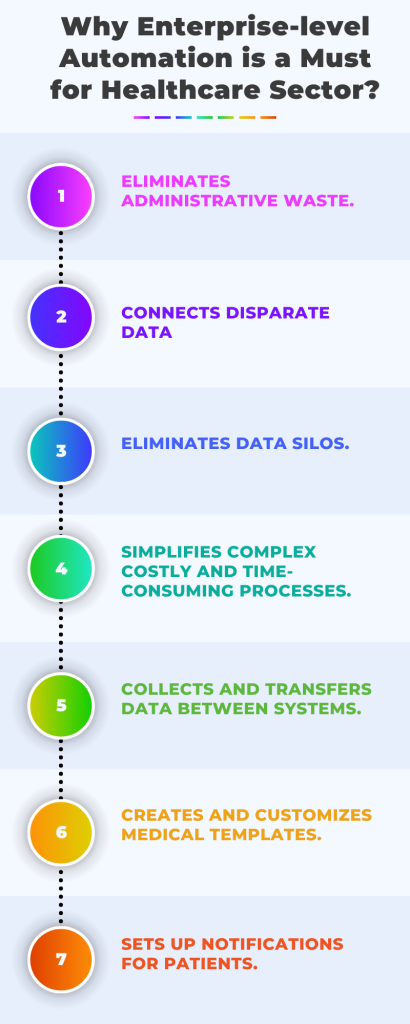
- Enterprise-level automation is highly relevant to the healthcare sector because it involves multiple processes and workflows.
- Enterprise-level automation in healthcare integrates digital technologies and advanced procedures.
- Enterprise-level automation in the healthcare sector addresses all shortcomings of manual systems providing an efficient, error-free system that improves patient care.
- Automation of a healthcare enterprise requires a holistic review of the different processes and identifying the processes best suited for automation.
- Technologies like RPA and AI work in tandem to facilitate enterprise-level automation in healthcare.
The COVID-19 pandemic has accelerated the digital transformation journeys of businesses across the globe. One of the worst-hit sectors during the pandemic is the healthcare sector. The demand for healthcare service providers surged during the pandemic. And, it was difficult to meet the rising demand for healthcare services because of the limitations of the healthcare sector.
In the wake of the pandemic, healthcare professionals have understood the importance of technology and are adopting different technologies to enhance efficiency and boost performance.
Technologies such as RPA and AI have made inroads in the healthcare domain. However, enterprise-level automation in healthcare is still not very popular.
Enterprise-level automation is the new buzzword that is raising the curiosity of businesses across the globe. Many organizations en route to their digital transformation journeys have familiarized themselves with various automation technologies. However, enterprise-level automation is still not widely adopted.
- What is Enterprise-level Automation?
- Some of the workflows in a healthcare enterprise include
- What is Enterprise-level Automation in Healthcare?
- Why Enterprise-level Automation is a Must for Healthcare Sector?
- Enterprise-level Automation Provides Several Benefits to the Healthcare System
- How Enterprise-level Automation can be Implemented in Healthcare Enterprises?
- In Conclusion
What is Enterprise-level Automation?
Enterprise-level automation unifies different software systems used across the organization into a holistic and effective ecosystem customized to the specific needs of the organization. It is a strategic approach to automation wherein the automation initiatives of the organization are focused on achieving the larger goal of a fully automated enterprise. The organization integrates departmental, sub-departmental, and other smaller automation projects with the larger goal. Enterprise-level automation entails a systematic review of the different processes and workflows and optimizing them with technology. Enterprise-level automation streamlines complex processes, enhances efficiency, brings transparency, and reduces costs.
The next question is, Is Enterprise-level Automation relevant to the healthcare sector?
The healthcare sector entails several processes working in tandem. Synchronization of these processes is essential to boost efficiency. However, many low-priority tasks often get delayed while catering to the high-priority tasks. This causes delays and impacts the outcomes and thereby the patient experience. Healthcare systems also require the management of large volumes of structured and unstructured data. Manual data management is slow and prone to human errors.
Enterprise-level automation is highly relevant to all types of businesses that involve multiple processes and workflows.
Some of the workflows in a healthcare enterprise include:
- Care coordination workflows
- Registration workflows
- Intake workflows
- Documentation workflows
- Revenue integration workflows
- Billing workflows
Manual processes have high-cost implications because they require a large number of staff for performing routine tasks. Besides, patients spend more time on paperwork than with their service providers. They suffer an “unpersonalized” care experience. In a manual system, clinicians spend less time in direct patient care. All this negatively impacts the patient experience. In today’s world, the awareness level of patients has increased and patients demand better care and attention.
Enterprise-level automation in healthcare integrates digital technologies and advances procedures. These technologies optimize different processes providing better outcomes thereby enhancing the patient experience.
Enterprise-level automation offers a holistic automation solution that integrates various administrative and non-administrative processes in the healthcare enterprise. Enterprise-level automation in the healthcare sector addresses all shortcomings of manual systems providing an efficient, error-free system that improves patient care.
What is Enterprise-level Automation in Healthcare?
Enterprise-level automation of healthcare entails the automation of:
- Care coordination workflows entail automation of care gap outreach, automated appointment reminders, self-serve scheduling, and more.
- Registration automation includes automated registration and demographic verification, automated self-pay collection, automated e-signatures, etc.
- Automated medical history, social history, and allergy collection streamline intake workflows.
- Documentation and orders can be streamlined with automation.
- Automation of charge capture, coding, claim editing, and claim attachments streamline revenue integrity.
- Automation of billing workflows entails automating denial management, claim status management, utilization review, CDI, tax management, and routing.
Why Enterprise-level Automation is a Must for Healthcare Sector?
Healthcare Industry requires enterprise-level automation because it:
- Eliminates administrative waste that burdens the healthcare sector.
- Connects disparate data of the industry and eliminates data silos.
- Simplifies complex costly and time-consuming processes.
- Enables users to collect and transfer data between different systems.
- Helps create and customize various medical templates.
- Automation helps set up notifications for patients.
- Facilitates online form filling by patients.
- Speeds up process payment documentation.

Enterprise-level Automation Provides Several Benefits to the Healthcare System:
- Automated healthcare enhances the speed and precision of the diagnostic process.
- It enables physicians to intervene in real time and take the required action.
- Enterprise-level automation minimizes errors as it eliminates the human element and helps offer more effective treatment.
- An automated platform enhances administrative operations by facilitating seamless data flow.
- Automation facilitates effective communication between healthcare service providers and patients.
- Automation minimizes delays by enabling healthcare providers to check the appointment dates of patients, confirmations, cancellations, and more.
- An automated healthcare system enhances patient satisfaction by simplifying appointment scheduling, improving the quality of care provided, minimizing delays, etc.
- Automation facilitates early treatment of disease by enabling healthcare in early detection.
- Automation facilitates adding patient data to healthcare centers or hospital databases. This simplifies the process of data access and transfer.
- In an automated healthcare enterprise all healthcare activities from patient intake to medical procedures, and complete recovery are highly efficient offering patients high-quality care.
- Automation enhances the quality of patient care by eliminating issues like failure of medical equipment, etc.
- Automation solutions help healthcare providers to adjust to unexpected changes in demand. It enables them to provide better care.
How Enterprise-level Automation can be Implemented in Healthcare Enterprises?
Automation of a healthcare enterprise requires a holistic review of the different processes and identifying the processes that are best suited for intelligent automation. Technologies like Robotic Process Automation (RPA), Artificial Intelligence(AI), etc. can be leveraged for enterprise-level automation. RPA bots can automate rule-based repetitive processes like appointment scheduling, billing, etc. Automation of routine tasks streamlines and centralizes such tasks. RPA bots relieve frees staff to perform tasks that require human interactions. The next step is operational automation which entails the automation of different workflows wherein each workflow comprises different automated processes. The next step is intelligent automation or AI-based automation. This stage of automation manages large volumes of unstructured data.
There are several enterprise-level automation providers in the market. Choosing the best one can be a difficult task. As a healthcare provider, you will need automation software that integrates with your existing systems and is aligned with your specific needs. Enterprise-level automation solutions are expensive to purchase. Hence, it is recommended that you consult an expert for guidance before you invest in procuring the software. The right automation partner can consolidate the automation of end-to-end processes and facilitate seamless cross-functional automation and scalability required for successful enterprise-level automation.
Auxiliobits has a team of knowledgeable and experienced professionals who are experts in various aspects of healthcare functions. Their technical expertise helps them suggest automation solutions that are best suited for your healthcare system. We help clients implement cost-effective automation solutions that enhance efficiency and offer a better patient experience.
In Conclusion
Automation opportunities are present at every level of healthcare systems. Identifying these opportunities and implementing automation can lead to a radical transformation in the healthcare sector. Enterprise-level automation enhances the efficiency, interoperability, revenue, and job satisfaction of employees in the healthcare ecosystem. It reduces labor costs, healthcare worker burnout and boosts productivity, and enhances the quality of work.
Call us Now for Enterprise-level automation solutions for your services!
Want to know more about automation enhancements in healthcare? Check out our forthcoming blogs!






